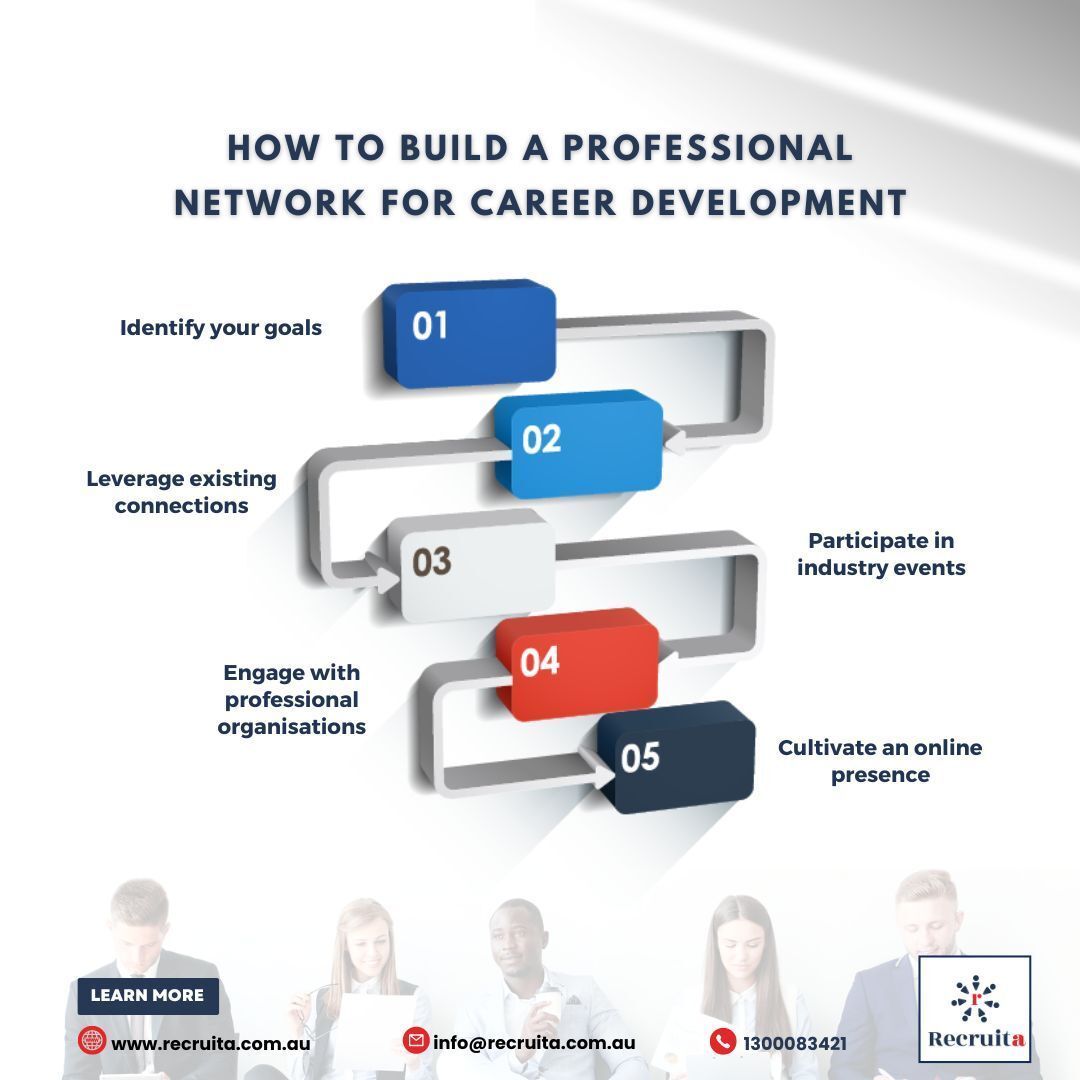June 26, 2024
The changing job market requires professionals to be adaptable and continuously learn new skills to stay competitive. Networking can help navigate this dynamic landscape by providing access to job opportunities, industry insights, and mentorship. In this article, we cover: What is networking? How to build a professional network How to expand your network reach The art of effective networking Nurture your network for long-term success Where to find people to network with Grow your career with Airswift What is networking? All things being equal, people will do business with, and refer business to, those people they know, like and trust. - Bob Burg Networking is not just a single action but a process involving multiple elements working together. It's not primarily about making sales ; selling may naturally follow from successful networking efforts. When you network, you're part of a larger team where everyone plays a valuable role. Your network comprises the people you've connected with through work and personal interactions. Building strong relationships is at the core of networking because these connections often lead to valuable referrals. Behind every referral is someone who vouches for your credibility, building trust in your abilities. Professional networking goes beyond collecting business cards; it fosters genuine connections and creates a mutually beneficial ecosystem. A strong network is invaluable for established professionals, offering many benefits beyond job hunting, such as access to industry insights, mentorship, and career advancement opportunities. How to build a professional network Identify your goals Defining your career aspirations and areas of interest is crucial to building a robust professional network. You can tailor your networking strategy to align with your career objectives by identifying your goals. For example, if you're interested in shifting industries or pursuing leadership roles , you can focus on connecting with professionals in those fields. This approach ensures that your networking efforts are focused and effective, helping you build a network that supports your career goals. Leverage existing connections Reconnecting with former colleagues, classmates, and professional acquaintances is an excellent way to expand your network. These individuals already know you and your work, making it easier to establish a connection. Additionally, seeking introductions from senior leaders or mentors within your current company can help you connect with influential individuals in your field. These connections can provide valuable insights, mentorship, and opportunities for career advancement. Informational interviews Informational interviews offer a wealth of industry insights and networking opportunities. Start by contacting professionals in your interest and expressing your desire to learn from their experiences. Prepare thoughtful questions to guide the conversation, listen actively, and express gratitude for their time. Keep in touch with interviewees to maintain connections and share updates on your progress. These interviews are valuable resources for exploring career paths and expanding your professional network. Expanding your network reach Participate in industry events Attending conferences, workshops, and industry gatherings relevant to your field can provide high-quality networking opportunities. These events offer a chance to meet like-minded professionals, learn about the latest industry trends, and establish yourself as a thought leader. Focus on events that provide targeted networking opportunities, such as roundtable discussions, workshops, or networking receptions. This approach ensures that your networking efforts are focused and effective, helping you build a network that supports your career goals. Engage with professional organisations Joining industry associations, alumni networks, or leadership councils can help you increase your visibility and connect with like-minded professionals. Participating in committees or volunteering for leadership roles can further enhance your networking efforts. These opportunities allow you to demonstrate your expertise, build your brand, and establish yourself as a leader in your field. Cultivate an online presence Optimising your LinkedIn profile with relevant keywords and accomplishments can help you establish a professional image and attract potential connections. Sharing thought leadership content and engaging in industry discussions online can also help you build your brand and establish yourself as an expert. Building a solid online presence can help you expand your network reach, connect with like-minded professionals, and establish yourself as a thought leader in your industry. Second, participation fosters professional growth by granting access to valuable resources and opportunities. Engaging in online communities like industry forums, Slack groups, and niche social media groups can provide access to a pool of individuals with common interests, facilitating meaningful connections. Thirdly, it allows individuals to showcase their expertise, amplify their brand, and expand their horizons by connecting with diverse people. Additionally, active involvement helps individuals stay current with industry trends, fostering personal growth and career advancement. Lastly, online communities enable building lasting relationships and friendships, enhancing networking experiences. The art of effective networking Make meaningful connections Networking has its rules, mainly centred around being a connector. A connector is someone others turn to for help. Networking isn't about you but the value your connections can offer. Focusing on helping others deepens relationships and creates goodwill. Networking is about who your connections know and the potential value they bring. Keep in mind that different industries have different norms. Observing interactions at events can help tailor your approach. Being too aggressive can deter people, so adapt your tone to suit the industry's nature. Research individuals beforehand and find common ground for conversation. Focus on building genuine relationships and offering value to your connections. By prioritising quality over quantity, you can create a network that supports your career goals and offers long-term benefits. Be a master communicator Honing your elevator pitch to articulate your career goals and expertise succinctly is essential for effective networking. Practice active listening and ask insightful questions to demonstrate a genuine interest in your connections. By being a master communicator, you can establish a solid first impression, build rapport, and establish a connection that supports your career goals . Here are ten questions you could ask that demonstrate genuine interest and curiosity and get a conversation started and going: What got you interested in your line of work? Could you tell me about a moment in your career that stood out? What's the best part of what you do? How do you see our industry changing soon? Have you ever faced a tough challenge at work that you overcame? Any good reads or resources that have inspired your approach to your job? If you could give one piece of advice to someone starting in our field, what would it be? Is anything exciting happening in your projects lately? How do you balance your job and personal life? What networking tips do you swear by for making meaningful connections? Body language is universal Body language is aessential aspect to effective communication during networking events. Positive body language can convey confidence, engagement, and interest. It can also help establish a connection with the other person, making the conversation more enjoyable and productive. On the other hand, negative body language can convey disinterest, discomfort, or lack of confidence. Here are 10 steps to being aware of your body language and consciously displaying positive body language during networking events: Maintain eye contact with the person you're speaking to. This shows attentiveness and confidence. Wear a genuine smile to convey warmth and approachability. It helps in creating a positive atmosphere during conversations. Use non-verbal cues such as nodding to show you're actively listening and engaged. It encourages others to continue sharing. Keep your body language open by avoiding crossing your arms, which can signal defensiveness or disinterest. Minimise fidgeting or restless movements. This conveys nervousness or lack of confidence. Instead, try to maintain a relaxed posture. Subtly mirror the body language of the person you speak to to establish rapport and build a connection. Respect personal space boundaries and avoid standing too close, as it can make others uncomfortable. Use appropriate hand gestures to emphasise points or express enthusiasm, but avoid excessive or distracting movements. Before attending networking events, practice your body language to become more aware of your non-verbal cues. Ask for feedback from trusted individuals on your body language to identify areas for improvement. Approach people Networking can be daunting, but the right approach is a valuable tool for building meaningful connections and advancing professionally. Here are actionable steps to help overcome fears, focus on helping others, and cultivate authentic interactions, ensuring that each conversation is a mutually beneficial exchange: Acknowledge any fear of talking to new people, but don't let it control you. Remember that each conversation is an opportunity to help someone in ways they may not even realise they need. Approach conversations with courage, focusing on how you can assist the other person rather than your fears or desires. Avoid desperation by genuinely focusing on the needs of others. This will shift the conversation away from what you can gain and how you can contribute. Engage fully in conversations by actively listening, nodding, agreeing, commenting, and asking thoughtful questions. This demonstrates your interest and investment in the interaction. Do not dominate conversations with stories about yourself. Instead, maintain a balanced dialogue in which both parties have an opportunity to contribute. Be genuine and authentic in all interactions. Authenticity fosters trust and attracts others to you, leading to meaningful connections. Maintain consistency in your behaviour and interactions. People appreciate knowing what to expect from you, which builds trust and reliability over time. Tell your story Storytelling is a powerful tool in networking. It can help create a personal connection with others, establish credibility, and make a memorable impression. Individuals can showcase their skills, values, and achievements by crafting compelling narratives about their career journey. Here are some actionable steps towards great storytelling with networking in mind: Tailor your story to resonate with your audience's interests, values, and needs. Share genuine experiences and emotions to establish credibility and build trust. Focus on the key aspects of your career journey, highlighting relevant skills, values, and achievements. Use vivid details and compelling anecdotes to make your story memorable and engaging. Rehearse your story to ensure clarity, coherence, and confidence in delivery. After sharing your story, follow up with a clear purpose, whether seeking further discussion, collaboration, or referrals. The power of follow-up A study by LinkedIn found that connecting on LinkedIn and sending personalised follow-up emails within 24-48 hours can help you maintain the momentum of your initial connection. Briefly recap your conversation and offer to connect them with relevant resources. Following up after a networking event is essential for building long-term relationships and establishing yourself as a valuable connection. Nurturing your network for long-term success Become a resource Offer your expertise and knowledge to support your network members. Recommend them for opportunities or make relevant introductions. By becoming a resource for your connections, you can build long-term relationships, establish trust, and establish yourself as a valuable connection. Maintain regular engagement Stay connected by sharing industry updates and congratulating them on their achievements. Schedule periodic coffee chats or virtual meetings to maintain relationships and demonstrate your commitment to building a solid network. By maintaining regular engagement, you can build long-term relationships, establish trust, and establish yourself as a valuable connection. Reciprocity is key Networking is a two-way street. Be genuinely helpful and supportive to build trust and long-term connections. By practising reciprocity, you can establish a mutually beneficial relationship that supports your career goals and offers long-term benefits. Competition can be healthy When faced with competition in a networking setting, consider this scenario: You're one of several fishbowl salespeople at an event with 1000 attendees. Being yourself naturally attracts those with whom you share a connection or interest. It's essential to recognise that there's enough opportunity for everyone present. Rather than pursuing every potential lead, focus on those who resonate with you. Look for individuals who could become long-term partners, providing ongoing business beyond just one transaction. Ask yourself: Do I genuinely enjoy this person's company? Could we see ourselves collaborating for years to come? Networking is a marathon, not a sprint. For sustained success, prioritise building relationships based on mutual trust and compatibility. Where to find people to network with Finding people to network with is simpler than you might think – they're everywhere! Here’s how: Begin engaging with those closest to you, such as friends and family. Practice delivering a concise elevator pitch highlighting your interests without dominating the conversation. Instead, focus on learning about others by asking genuine questions and showing interest in their experiences. Use everyday situations, like waiting in line at the bank or chatting with fellow gym-goers, to practice your networking skills. Consider joining community associations, Chambers of Commerce, or trade organisations and attend trade shows to connect with like-minded individuals. Remember to be approachable, friendly, and genuinely interested in others beyond what they can offer you. As you engage with more people, networking becomes more natural and enjoyable. Three questions to ask every person to guarantee a follow-up meeting post-networking Towards the end of a conversation, once you have all the information you can get about someone, ask the following questions: Are you looking for new clients/prospects at this time? What sets you apart from your competition? What does your ideal client look like? If this is the case, let them know you have some people who could use their services or need their help. Ask if they might be interested in getting their details. If it’s a yes, arrange a meeting time and follow through on your promise to help. When you show up for your meeting, pass on that referral or the name of a great contact to them. Doing so creates trust and a relationship, proving that you can and will help when you can. This makes them want to do the same for the other person, and you are now truly part of their network. Grow your career with Airswift 85% of all jobs are filled through networking , highlighting its importance in landing jobs. A strategic professional network is crucial for career advancement, providing access to opportunities, mentorship, and industry insights. However, building and maintaining a solid network can be challenging, with time management and introversion being common obstacles. To overcome these challenges, prioritise networking activities that align with your career goals, leverage existing connections, and allocate time for networking activities. Whether you're looking to advance your career, explore new opportunities, or stay up-to-date with the latest industry trends, Airswift has the expertise and resources to help you succeed. Contact us today to learn more about our services and how we can support your professional growth. Source: https://www.airswift.com/blog/professional-networking



